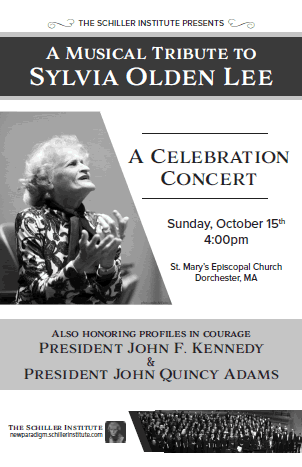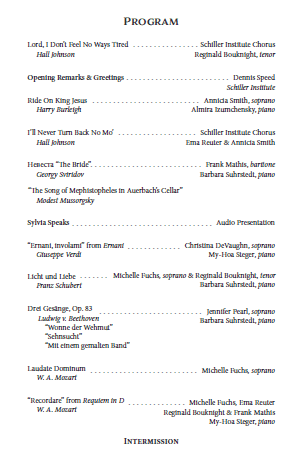Dorchester Concert Honors John Quincy Adams, John Kennedy, and Sylvia Olden Lee
by Jennifer Pearl
October 2017
October 16, 2017—Yesterday, bel canto voices, quite unusual for the neighborhood, sang Spirituals, German Lieder, quartets, and operatic arias just a few miles from the spot where the first bullets of the American Revolution were fired in 1775. The singing resounded from the wooden rafters of St. Mary’s Episcopal Church (built in 1888) which is slightly hidden in a Dorchester (Boston, Massachusetts) neighborhood. For one of those who attended, this was the first time she had ever heard “live classical music” in her entire life.
The Schiller Institute Boston Community Chorus organized the concert in Boston, as part of a nation-wide year-long centennial celebration for Sylvia Olden Lee. The concert, attended by approximately 65-75 people, was organized primarily to activate the population “outside” the “regular classical music opera-going crowd,” and to demonstrate that not only is Classical music universal, but that it’s actually necessary in society. While the concert was dedicated to the three American heroes named in the title above, there was also a special dedication to Robert Honeysucker, a Boston-based and internationally-acclaimed baritone who had passed away just a week before the concert, after having sent a written account of his own work with Sylvia Olden Lee to be read aloud at the concert.
The program was varied, and included twelve performers: four pianists and eight singers. Three a capella Spirituals were sung by the Schiller Institute Community Chorus. Many of the soloists were also key members of the chorus, and all the pianists also sang in the chorus. The program began with a powerful rendition by bass Kevin Thompson, of “Lord, God of Abraham” from Mendelssohn’s Elijah. This young, up-and-coming singer had agreed at the last minute to sing in the concert to honor Ms. Lee, who had been a teacher of his music teacher and a major factor in his pursuing a music degree and a singing career. The concert ended with a choral Spiritual arranged by William Dawson, “Ev’ry time I feel de Spirit.” Other works included Roland Hayes’ Life of Christ cycle sung by tenor Reginald Bouknight and baritone Frank Mathis. Particularly poignant was the “Recordare” from Mozart’s Requiem, accompanied by My-Hoa Steger and sung by Michelle Fuchs, Ema Reuter, Reginald Bouknight, and Frank Mathis. This recalled to memory the great 2014 Requiem performance in Boston at Holy Cross Cathedral in memory of President Kennedy, while honoring the passing of Mr. Honeysucker and the recent deaths in Houston, Florida, Puerto Rico, and Mexico from the hurricanes and earthquake.
Some audience members had heard about the concert by receiving a flyer at other concerts, many came from the congregation of the church itself, and some came from the neighborhood. Most stayed throughout the entire two hour-plus concert and eagerly remained afterward for the reception, to meet the performers and talk about what they had just experienced. Many expressed interest in joining the chorus.
There was a sense of electricity in the room, and despite the size of the sanctuary, there was a real intimacy between the audience and performers and a deep collaboration among the performers. It wasn’t a collection of performances by individuals; it was a woven tapestry of pieces representing different composers and cultures, but with one thread that brought it all together, and all driving toward one idea.
Lyndon LaRouche often references fondly a close friend of his and Helga’s, Gertrude Pitzinger, a great contralto of the 20th Century, who, before she died, invited Lyn and Helga to her home, instructed Helga in the recitation of certain German poems, and then played her own recorded performance of song-settings of the same poems. Before they saw her for the very last time, she proclaimed, “I have lived to sing these songs.”
It is this quality of agapē and commitment to the future that the British empire despised about the mission of Boston native John F. Kennedy, and thus assassinated him. This concert represented an important step in reviving that culture for this generation and beyond.



